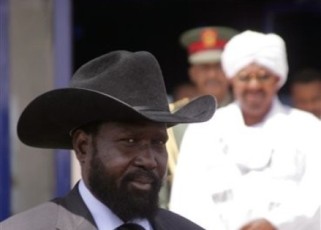Sudan, S. Sudan form committees to tackle post-split issues
October 8, 2011 (KHARTOUM) – Sudan and South Sudan have setup five task-forces to trash out issues of economy and border security among others as the visit of the southern president Salva Kiir Mayardit entered its second day.

This is Kiir’s first visit to the country of which he was a first vice-president from 2005 until July this year when the south declared independence from Khartoum in line with the outcome of a vote held at the start of this year.
His visit aims to yield a breakthrough in floundering talks between the two nations on a host of contentious issues including management of oil resources and the border region of Abyei whose ownership is claimed by both sides.
The five committees include bilateral relations, economy, higher education, humanitarian affairs and border security.
Sudan’s minister of finance and national economy, Ali Mahmud, said that the two sides had agreed on five points in the fields of economic cooperation and banking exchange as well as on establishing a joint administration to manage oil facilities and promoting cross-border trade.
He also said the two sides discussed external debts without ebaorating.
Sudan and South Sudan agreed in March this year to jointly seek clearance of Khartoum’s external debts which stand at $38.7 billion and incurs an annual servicing of more than $1 billion, according to Sudan’s foreign minister Ali Karti.
Also Sudan’s defense minister Abdel-Rahim Mohamed Hussein held a meeting on Saturday with South Sudan’s minister of national security Oyai Deng Ajak in the presence of the southern deputy minister of defense Majak Agot Atem.
Commenting on the meeting, the spokesman of Sudan’s Armed Forces (SAF), Alsoarmi Khalid Saad, told the official SUNA that the two sides had agreed to foster military and security cooperation.
Separate talks were also held between the head of Sudan’s intelligence apparatus, Mohamed Atta, and Oyai Deng Ajak. According to state media, the talks focused on reaching stability along the shared borders.
Last month, Sudan and South Sudan signed a deal to open crossings along their 2,200 km borders which remain without proper demarcation. They also agreed to setup 300 teams to monitor shared with assistance from Ethiopian peacekeepers serving in Abyei region.
Citing South Sudan’s minister of foreign affairs and international cooperation, Nihal Deng, SUNA reported that the external relations committee had agreed to dispatch northern diplomatic cadres to train southerners and help in constructing government institution.
With regards to humanitarian affairs, the commissioner of Sudan’s humanitarian authority stated that the committee had focused on drawing general guidelines to assist the two countries to conduct humanitarian relief operations across borders.
Commissioner Suleiman Abdel Rahman further said the two sides also touched on the issues of southern returnees who are stuck in Kosti port and Blue Nile in Sudan, agreeing to provide financial support to transport them to the south.
The relations between north and south Sudan have been largely defined by tension and recrimination before and after the south gained independence following more than two decades of civil war which ended with the signing of the Comprehensive Peace Agreement in 2005.
Both nations accuse each other of supporting armed groups in their respective territories and so far failed to reach an agreement on how to manage oil resources.
According to the UN, both countries failed to honor their commitment to withdraw their troop from Abyei.
(ST)

Future of ROSS
Sudan, S. Sudan form committees to tackle post-split issues
Such committees should have active, intelligent and strong elder statemen like uncle Bona Malual and uncle Elijah Malok Aleng. Other key people in ROSS like Dr. Tombekana Munaja, Chuol Rambang,Joseph Ukel, Gabriel Changson Chang and Dr. Lual Achuek. I believe these people can add value on the negotiation table althou they are not currently playing any role in the government.
nafitabu
Sudan, S. Sudan form committees to tackle post-split issues
WHY DO YOU WANT ONLY ONE TRIBE>?
Thon machar majak
Sudan, S. Sudan form committees to tackle post-split issues
we must forward ever than expecting some drawbacks otherwise we shan’t give up
garang alive
Sudan, S. Sudan form committees to tackle post-split issues
mr Nafitabu what is needed here is what will South Sudan one step forward.in any community or society elders are better in analysis. that is one issue another word you mentioned in your comment why it is one tribe, we better leave so call tribe and stick on southernerism this will give one love one nation.
reply [email protected]